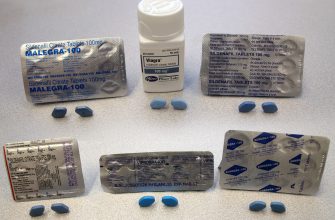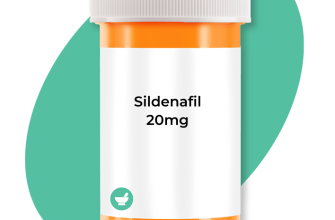If you’re considering prescription Viagra, understanding its benefits and appropriate use is crucial. This medication is specifically designed to help men deal with erectile dysfunction by increasing blood flow to the penis during sexual stimulation. By targeting the underlying issues, Viagra allows for more successful and satisfying intimate experiences.
Consulting a healthcare professional is the first step. They can assess your overall health and any pre-existing conditions that might affect how Viagra works for you. This personalized approach ensures that the medication is safe and suitable for your situation.
Dosage matters. Typically, doctors prescribe Viagra in strengths of 25mg, 50mg, or 100mg. Starting with a lower dose may be recommended to gauge your body’s response. This cautious method helps avoid potential side effects while finding the right balance for effectiveness.
Timing is key too. For best results, take Viagra approximately 30 minutes to an hour before sexual activity. Its effects can last up to four hours, giving you flexibility while engaging in intimate moments.
Being aware of possible interactions with other medications is essential. Inform your doctor about any other treatments you are undergoing, particularly nitrates or medications for blood pressure. Recognizing these interactions can prevent complications and ensure your safety.
Viagra is not an aphrodisiac, so arousal is still necessary for it to work. Combining Viagra with a healthy lifestyle, including regular exercise and a balanced diet, can enhance its effects and contribute to overall well-being.
- Prescription Viagra: A Comprehensive Guide
- How to Obtain Prescription Viagra
- Using Viagra Safely
- Understanding Viagra: What It Is and How It Works
- Who Should Consider Prescription Viagra?
- Common Side Effects of Viagra and How to Manage Them
- Headaches and Flushing
- Upset Stomach and Nasal Congestion
- Dosage Guidelines for Prescription Viagra
- Adjustment of Dosage
- Special Considerations
- How to Obtain a Prescription for Viagra
- Precautions and Warnings When Using Viagra
- Interactions Between Viagra and Other Medications
- Nitroglycerin and Other Nitrates
- Alpha-Blockers
- Tips for Maximizing the Effectiveness of Viagra
- Timing Matters
- Hydration and Alcohol
Prescription Viagra: A Comprehensive Guide
When seeking treatment for erectile dysfunction, prescription Viagra is a common choice. This medication contains sildenafil, which enhances blood flow to help achieve and maintain an erection. Follow these guidelines to ensure safe and effective use.
How to Obtain Prescription Viagra
Consult with your healthcare provider to discuss your symptoms. Prepare to share:
- Your medical history, including any pre-existing conditions.
- Current medications and supplements.
- Any allergies you have.
Your provider may conduct tests to determine the underlying cause of erectile dysfunction. If Viagra is suitable, they will provide a prescription tailored to your needs.
Using Viagra Safely
Adhere to the following recommendations for optimal results:
- Take Viagra approximately 30 minutes to 1 hour before sexual activity.
- Swallow the tablet whole with a glass of water, avoiding high-fat meals that could delay effects.
- Do not exceed the recommended dose. A standard dose usually ranges from 25 mg to 100 mg per day.
Understand potential side effects, which may include headaches, flushing, or upset stomach. If you experience severe reactions such as chest pain or an erection lasting more than 4 hours, seek medical help immediately.
By following these guidelines, patients can enhance their sexual health and improve overall well-being with prescription Viagra. Always keep an open line of communication with your healthcare provider for the best outcomes.
Understanding Viagra: What It Is and How It Works
Viagra is a medication primarily used to treat erectile dysfunction (ED). It contains sildenafil citrate, which relaxes blood vessels in the penis, allowing for increased blood flow during sexual arousal. This enhanced circulation helps achieve and maintain an erection.
When taken orally, Viagra typically begins to work within 30 to 60 minutes, and its effects can last for up to four hours. This timeframe makes it suitable for spontaneous sexual activity, provided there is sexual stimulation. The recommended starting dose is 50 mg, which can be adjusted based on individual response and tolerance.
Understanding how Viagra functions involves knowing its mechanism. It inhibits an enzyme called phosphodiesterase type 5 (PDE5), which can restrict blood flow. By blocking this enzyme, sildenafil promotes the relaxation of smooth muscles in the corpus cavernosum, increasing blood flow and facilitating an erection when arousal occurs.
Consulting a healthcare provider before using Viagra is crucial. They can assist in determining if it is appropriate based on personal health history and potential interactions with other medications. Common side effects might include headaches, flushing, or an upset stomach, but serious complications are rare when taken as directed.
Combining Viagra with healthy lifestyle choices such as maintaining a balanced diet, exercising regularly, and reducing alcohol consumption can enhance its effectiveness and overall sexual health.
Who Should Consider Prescription Viagra?
Men experiencing erectile dysfunction (ED) should consider prescription Viagra. This condition affects confidence and intimacy, and Viagra can provide a solution. If you find it difficult to achieve or maintain an erection consistently, discussing this medication with a healthcare provider is advisable.
Individuals with underlying health issues, such as diabetes or prostate problems, may also benefit from Viagra. These conditions often contribute to ED, making treatment essential for improving sexual health and overall well-being.
Age can impact erectile function, so older men experiencing changes in their sexual performance should consult a doctor. Viagra may significantly enhance quality of life for those within this demographic.
Men taking medications that interfere with sexual function, including certain antidepressants or blood pressure medications, should explore Viagra as a potential alternative with their healthcare provider.
Discussing lifestyle factors is beneficial. Heavy smoking, excessive alcohol consumption, and lack of exercise can lead to ED. Those ready to address these issues through medication can find Viagra a helpful addition to a broader health strategy.
In summary, if ED affects your life, whether due to medical issues, age, medication side effects, or lifestyle choices, prescription Viagra may be an effective option. Open communication with your healthcare provider will guide you to the best decision for your needs.
Common Side Effects of Viagra and How to Manage Them
Some users experience side effects while taking Viagra. Common effects include headaches, flushing, upset stomach, and nasal congestion. Understanding how to alleviate these issues can enhance your experience with the medication.
Headaches and Flushing
Headaches often occur due to changes in blood flow. To manage this, consider taking over-the-counter pain relief like ibuprofen or acetaminophen. Staying hydrated can also help mitigate headaches. Flushing, characterized by redness or warmth in your face and neck, typically resolves on its own. Wearing loose clothing and staying cool can provide additional comfort.
Upset Stomach and Nasal Congestion
If you experience an upset stomach, taking Viagra with food may help reduce gastrointestinal discomfort. Avoid heavy or spicy meals that can exacerbate the issue. Nasal congestion can be managed with saline nasal sprays or decongestants, which help clear your nasal passages. If congestion persists, consult with your doctor for alternatives.
Always consult your healthcare provider before starting any new treatment or making changes to your current regimen. They can offer tailored advice to suit your specific health needs.
Dosage Guidelines for Prescription Viagra
The recommended starting dose of Viagra (sildenafil) for most men is 50 mg, taken about one hour before sexual activity. It’s crucial to take it approximately one hour in advance for optimal results. The dosage can be adjusted based on individual response and tolerability.
Adjustment of Dosage
If the 50 mg dose is not effective, your healthcare provider may increase it to a maximum of 100 mg. Conversely, if side effects occur, reducing the dose to 25 mg may alleviate discomfort. Do not exceed one dose in a 24-hour period.
Special Considerations
For men aged 65 and older or those with certain medical conditions such as liver impairment or severe kidney disease, starting with 25 mg may be advisable. Always consult with a healthcare provider for personalized recommendations and adjustments based on individual health status and medication interactions.
How to Obtain a Prescription for Viagra
Schedule an appointment with your healthcare provider. During the visit, discuss any concerns regarding erectile dysfunction, including symptoms and potential causes. Honesty is key–sharing your full medical history and current medications helps the doctor recommend the best treatment.
Your doctor will evaluate whether Viagra is appropriate for you. Be prepared to answer questions related to your cardiovascular health and lifestyle, as these factors influence the safety of the medication. If deemed suitable, your doctor will provide a prescription.
Once you have the prescription, choose a reputable pharmacy to fill it. You can opt for a local pharmacy or an online service. Verify that the online provider is licensed and requires a valid prescription. Some pharmacies may offer discounts or generic alternatives, so inquire about options.
If you prefer a more straightforward process, consider telemedicine services. Many online platforms allow you to consult with licensed healthcare professionals via video calls. They can assess your condition and prescribe Viagra if appropriate based on your responses.
Always follow the prescription guidelines provided by your healthcare provider. Adhere to the recommended dosage and inform your doctor about any side effects or concerns during treatment.
Precautions and Warnings When Using Viagra
Before taking Viagra, disclose your medical history to your healthcare provider. This includes any cardiovascular conditions, liver or kidney issues, or if you’ve experienced a stroke or heart attack.
Avoid using Viagra with nitrates, commonly prescribed for chest pain, as this combination can lead to a dangerous drop in blood pressure. Inform your doctor if you are taking any recreational drugs or medications that affect blood pressure.
Do not exceed the prescribed dosage. Taking more than recommended increases the risk of side effects without enhancing the drug’s effectiveness.
If you experience any sudden vision or hearing loss, seek immediate medical attention. This could indicate a serious condition that requires prompt care.
Be cautious if you have conditions such as sickle cell anemia, multiple myeloma, or leukemia, as these may increase the risk of complications.
The use of Viagra may cause dizziness or lightheadedness. Avoid driving or operating heavy machinery until you know how the medication affects you.
Alcohol consumption can reduce the effectiveness of Viagra and increase the likelihood of side effects such as dizziness. Limit your alcohol intake while using this medication.
| Condition | Precaution |
|---|---|
| Heart Problems | Consult a doctor before use |
| Liver Disease | Use with caution |
| Kidney Issues | Consult with your healthcare provider |
| Low Blood Pressure | Avoid use with nitrates |
| Vision Disorders | Report any changes immediately |
Always follow your doctor’s instructions and report any concerns you may have about taking Viagra. Regular follow-up appointments can help monitor your health and the medication’s effects.
Interactions Between Viagra and Other Medications
Consult your healthcare provider before using Viagra, especially if you take medications for heart conditions, high blood pressure, or HIV. Certain drugs can lead to serious side effects when combined with Viagra.
Nitroglycerin and Other Nitrates
Avoid taking Viagra with nitroglycerin or any other nitrate medications. This combination can cause a dangerous drop in blood pressure, potentially leading to dizziness or fainting.
Alpha-Blockers
If you are on alpha-blockers for prostate enlargement or hypertension, use Viagra carefully. This combination can also lead to low blood pressure. Consult your doctor for guidance on timing your doses to minimize risks.
Antibiotics, antifungals, or medications for seizures may affect how Viagra works. Always inform your doctor about all the medications you are taking to ensure safe use. Regular check-ups can help monitor potential interactions and allow for adjustments to your treatment plan as necessary.
Interactions can vary from person to person. Continuous communication with your healthcare provider ensures safe and effective use of Viagra alongside other medications.
Tips for Maximizing the Effectiveness of Viagra
Take Viagra on an empty stomach. Consuming heavy meals or fatty foods prior to taking the medication can delay its absorption, leading to diminished effects. A light snack is acceptable but keep meals simple.
Timing Matters
Plan the intake of Viagra carefully. For optimal results, take the pill approximately 30 to 60 minutes before anticipated sexual activity. This allows sufficient time for the medication to activate.
Hydration and Alcohol
- Stay hydrated. Drinking plenty of water helps your body process the medication more effectively.
- Limit alcohol consumption. It can interfere with Viagra’s effectiveness and may increase the risk of side effects.
Maintain a healthy lifestyle. Regular exercise, balanced nutrition, and avoiding smoking contribute positively to sexual health and enhance Viagra’s impact.
Consult with your doctor about any other medications or supplements you take. Some can interact with Viagra, reducing its effectiveness or increasing the likelihood of side effects.
Monitor your mental state. Stress and anxiety can inhibit sexual performance, thus affecting the results of Viagra. Consider relaxation techniques or therapy as beneficial additions to your routine.








